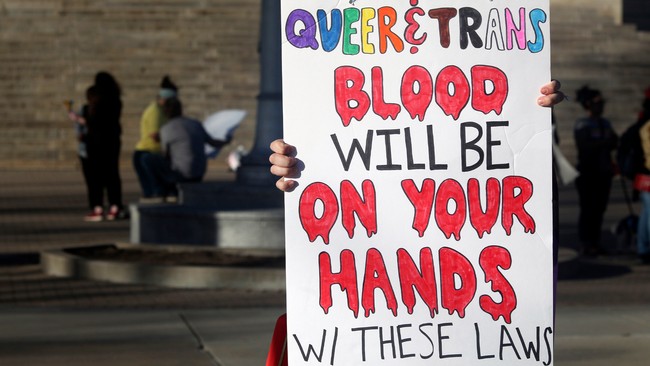We support our Publishers and Content Creators. You can view this story on their website by CLICKING HERE.

Did you know that the increasingly popular and already supermajority movement to reverse the alphabet ideology insanity is a Putinesque plot to advance cisgender White Supremacy?
Advertisement
I didn’t. Neither do the hundreds of millions of Americans who are sympathetic to the argument that sterilizing and mutilating children and forcing girls to compete against boys is insane
M Gessen at NYT argues that banning gender transition treatment for kids, given that treatment may cause infertility, is part of a larger Republican plot to control reproductive autonomy: https://t.co/1x0ZWnTqq0
— Benjamin Ryan (@benryanwriter) November 22, 2024
M. Gessen, an opinion columnist for The New York Times and transgender activist, carefully lays out her argument that if children want to be sterilized and mutilated, it is just one of many choices they may come to embrace or regret and that the movement to protect them from sadistic ideologues bent on imposing their ghoulish ideology are stifling the freedom of children to be their authentic selves in the service of a Christian nationalist agenda.
Blah, blah, blah. This is the critical theory power dynamic argument that shoehorns every political dispute into a convenient framework of oppressors and oppressed. Such frameworks only coincidentally bolster the claim that any desired societal change of the writer is based on civil rights.
In the wake of an election in which Donald Trump stoked fear about trans people — as in the much-discussed ad that warned “Kamala is for they/them. President Trump is for you” — Democrats are now debating how much the issue of trans rights hurt them and how fast they should retreat from it. Which is remarkable, because throughout her brief campaign, Kamala Harris was all but silent on the subject. It’s not clear how much further Democrats could actually retreat.
The party’s decision to focus on the issues that matter to most voters, especially reproductive rights, and set trans rights aside is based on a misconception. The two issues can’t be separated, because trans rights don’t just resemble reproductive rights; trans rights are reproductive rights.
In the last couple of years, as the right wing in the United States has stepped up its attacks on trans people, it has devoted tremendous energy to curbing access to gender-affirming care for minors (and in some cases adults). Supporters of such legislation argue that young people are not qualified to make — or even participate in — decisions they may regret later in life.
Of course, young people make all kinds of decisions they may later regret. But opponents of trans rights argue that there is an area in which the consequences can be nothing short of catastrophic, and that area is reproduction. Whether the focus is gender-affirming care, sports teams or bathrooms, the mission is, invariably, to protect women and girls from trans people. Two stars of the campaign to limit access to care are Chloe Cole in the United States and Keira Bell in the United Kingdom, girls who transitioned to being boys and later detransitioned to being young women. Both of them have repeatedly expressed fear that the treatment they received as teenagers could have rendered them infertile. It may or may not have; the long-term effects of puberty blockers followed by hormone therapy aren’t well known, though many trans men who started hormone treatment as adults have been able to get pregnant.
Still, infertility seems to inhabit its own special category of cultural anxiety. One influential voice sounding an alarm about gender-affirming care is Abigail Shrier, whose 2020 book, “Irreversible Damage: The Transgender Craze Seducing Our Daughters,” advanced a view of transness as a social contagion endangering America’s children. Its cover features a picture of a little girl with a perfect round cutout where her reproductive organs would have been.
I am trans and I am a parent of three children, one of whom I carried. Their existence, and my relationships with each of them, are essential to my understanding of life itself. I also have many friends (none of them trans, as it happens) who never had children. I occasionally envy their freedom. They may occasionally envy me my sprawling family. In neither case is the feeling of regret — if it can even be called that — significant or particularly long-lasting. It is, rather, an awareness that life is a series of choices, all of which are made with incomplete information.
Advertisement
There’s a lot packed into these few paragraphs and a lot more paragraphs in the essay–much of which is focused on a parade of horribles that amounts to “Trump wants to create a “Handmaid’s Tale” America or recreate Russia in the United States.
It is always Russia and Putin. As Obama would say, “The 1980s called, and they want their foreign policy back.”
There are lots of things important about this essay, but I want to focus on a few.
One, of course, is the indifference to the idea of protecting children due to their status as proto-adults and not rational adults. The process of maturing is learning how to think, make good decisions, control one’s impulses, and limit personal experimentation to less destructive choices.
We try to limit kids from making life-altering decisions before they are rational for very good reasons. They don’t know how to think about actions and consequences because they have no baseline knowledge and experience to make good decisions.
Almost as important is the process of socialization, in which people learn the appropriate limits of what kind of behavior will allow for success or promise failure in life. It’s why we don’t let children create Onlyfans accounts, discourage inappropriate use of social media, or encourage experimentation with drugs and alcohol.
None of these and other observations about protecting children from dangerous actions is controversial outside Queer circles, but Queerness is all about destroying social norms. That’s why mental illness is now “neurodiversity,” gender identity is preferable to relying on biology, and Queers are for Palestine. Anything that destroys the social norms of society is inherently good, and nothing destroys social norms more than destroying the natural maturation process.
Advertisement
Destruction is the goal of Critical Theory–that is why it is “critical.” It is critical of social order, and has as its moral foundation a claim to radical freedom, although that freedom paradoxically only applies to the critical theorists who bludgeon anyone with whom they disagree.
What does this have to do with the Democrats? M. Gessen speaks for the dominant ideological wing of the Democratic Party–not the average Democrat, obviously–and is using the pages of The New York Times to warn the Democrats that Harris’ failure on the trans issue was to defend alphabet ideology and the consequence is that Putinesque policies are being imposed now.
This is the dominant view of Democratic Party activists and why deviation from a full-throated endorsement of alphabet ideology among Democratic politicians is being harshly punished. The Battle of the Bathrooms is one front in the war, where Hakeem Jeffries was forced to defend a man using the Women’s room. Another is the Seth Moulton battle, where the Democratic Party of Massachusetts is denouncing the (hypocritical) Congressman, who will be primaried and is being raked over the coals for agreeing with his constituents.
The ideological essence of the Democratic Party has become Critical Theory, which is why the most vicious front in the culture war is among liberals who disagree on this issue. Pragmatic Democrats and just “normal” Democrats are worried or repelled by the radicalism of alphabet ideology, but alphabet ideology is the ideological glue of the current Democratic Party.
Advertisement
Both the activists and big donors are committed to it, and it’s hard to see how the politicians who just want to win get out of the bind they are in.
The Democrat civil war is inevitable, even if the party grandees desperately want to avoid it.

 Conservative
Conservative  Search
Search Trending
Trending Current News
Current News 







